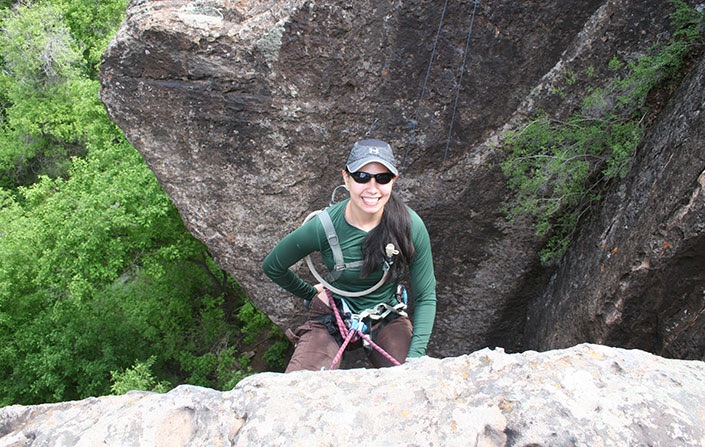Microsoft program manager and Air Force reservist forges two career paths

In the tech world, ambitious people often face a tough career choice: Dive deeply into a specialized technical role or focus on leading teams toward big-picture goals. Kathleen Voelbel chose both. An Air Force Reserve officer and program manager at Microsoft, Voelbel has created a career path that lets her balance all her strengths. It means extra effort, but she’s not complaining.
“It’s rough at times,” Voelbel says. “On occasion, I think ‘I don’t have to do this, I’m done with my commitment,’ but I remember why I’m doing it: I want to be part of something bigger than myself. Nothing about being a reservist is ever easy — the things that are easy are not that fulfilling.”
Despite the long hours and the extra responsibilities, Voelbel is glad to be serving her country through the Air Force Reserve. She enjoys solving intricate technical problems that will ultimately matter to the country’s defense. At the same time, she enjoys leading teams and driving complex projects to completion. As her two careers have progressed, she’s had chances to divide her attention by focusing on technical roles in the military and leadership roles in civilian life, or vice versa. At other times, both her civilian and military roles have blended technical focus and team leadership, giving her unexpected insights and personal growth.
Voelbel grew up in a military family and attended the Massachusetts Institute of Technology on an Army ROTC scholarship, earning a bachelor’s degree in aerospace engineering with information technology. But when the time came to begin her service, the Army was facing a surplus of commissioned officers. Voelbel was offered an unusual option: immediate placement in the Army Reserve component. She accepted, and divided her time between an engineering position at Raytheon Integrated Defense Systems and an assignment as platoon leader and later executive officer in the Massachusetts Army National Guard. After a few years, she realized it was time to flip the two roles.
“On my civilian side I was an individual contributor, and the military side, in the Army, I was an officer and leader,” Voelbel says. “I was executive officer of a company that had about 100 soldiers, and I enjoyed that kind of work, but I wanted, in my civilian career, to move toward positions of greater responsibility, to lead, manage and influence technical projects.”
To make the switch work, Voelbel moved from the Army to the Air Force Reserve, where she was able to take on a military role that offered greater technical challenges and flexibility. She divided her time between Massachusetts, for her civilian job and progress toward her master’s in engineering and management at MIT, and Alabama, for her Air Force Reserve duties in modeling and simulation with a focus on computational fluid dynamics. As she neared graduation, she began networking to find a civilian role that would allow her to continue to balance her Reserve commitment and her professional development. A former classmate referred her to a special military recruiting event organized by Joe Wallis, senior military engagement manager for Military Affairs at Microsoft.
“I think they flew in around 30 veterans, and we had five different interviews with five different hiring managers,” Voelbel says. “Which is different than the normal loop, where you typically apply for one job and talk to five people about that one position. So it was a lot of exposure to a few different jobs and roles — and by people who already valued the military.”
The Microsoft recruiters were impressed with her military, professional and academic achievements, and offered her a position. Now she works as a program manager for Microsoft’s Exchange High Availability/Storage team. When Voelbel relocated to the Seattle area, she was able to transfer her Air Force Reserve duties to Los Angeles. As part of the Individual Mobilization Augmentee program, Voelbel has flexibility to schedule fewer, longer duty assignments rather than reporting for a weekend every month. That saves travel time and makes it easier for her to manage her civilian workload around her military responsibilities.
“This is only the second year I’ve been at Microsoft, and so far I’ve clustered my work in the winter months, with the sunshine in LA,” Voelbel says with a laugh. “But it also helps with continuity and progress with the military projects I’m working on.”
Even with that flexibility, Reserve duties are a significant time commitment, and Voelbel says it’s important for reservists and their managers to be aware of the time required and to plan carefully for days reservists will be out of the office.
“Most people think, ‘Oh, you’re a reservist; you just go in and get your work done.’ That’s almost never the case,” Voelbel says. “Organization is essential: make time to manage your military career and be prepared for duty, put it on your calendar. And with travel, scheduling the work far in advance and letting my manager know when I’ll be gone. I’m not always very accessible when I’m doing my military duty, so I make it clear that I won’t be able to check email, and I have proper backup in place for my work at Microsoft.”
With careful preparation and hard work, Voelbel is able to accomplish both civilian work and military service, and she’s proud of her efforts.
“The reservist lifestyle has worked out for me, because I enjoy having both careers going on at once,” Voelbel says. “I’ve been fortunate that I’ve had the flexibility to choose both my career paths, both military and civilian, and in a way that they complement each other.”
